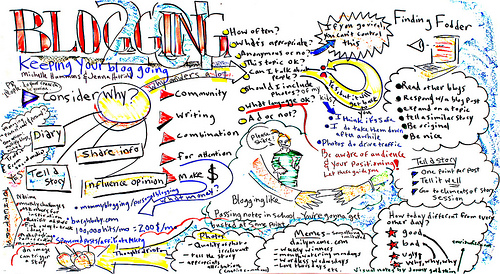4
Working through the sections of this Pressbook, you have had a chance to understand what it means to do open research, what are some of the ethical issues that may arise from doing research in the open, and to discuss the benefits and shortcomings of public dissemination. In this chapter we invite you to reflect on your own experience of being an open researcher.
Learning Objectives
You will gain an understanding of:
- Why open researchers reflect in the open
- When to reflect and who is involved in open reflection
- Some tools to help open reflection
4.1. Researchers Reflect on Reflection
You may not realize it but the act of reflecting is a constant activity, which for the most part remains elusive. We go through our day thinking about what’s been happening, how we feel about it, how we react to events and what are the next steps to take. In research, we tend to record these thoughts as a way of evaluating our progress.
In these three short audio podcasts some researchers talk about their take on reflection in research and how reflection can happen openly.
You can find transcripts of all the audio in the Appendix.
Leigh-Anne Perryman (Academic Staff Tutor and OER Research Hub Open Fellow) on the role of reflection in research.
Tita Beaven (Head of Department and Senior Lecturer, The Open University) on the role of reflection in research.
Tita Beaven (Head of Department and Senior Lecturer, The Open University) on conducting research in the open.

4.2. Blogging and Reflection
Reflection in research is closely linked to evaluation: it is about making sense of what we have done, what we are doing and how we are going to evolve. What do we gain or lose when we share this evaluation publicly? Why reflect in the open?
Activity 16: Catherine and Megan (45 minutes)
We invite you to read two blog posts: in the first one, Catherine Cronin, a lecturer in Information Technology at the National University of Ireland, Galway, reflects on her topic of research: digital identity practices in open education. The second blog post is a reflection by Megan Beckett, Project Manager at Siyavula, on her experiences of sharing.
Read both blog posts and think about the following questions:
- Why do Catherine and Megan blog?
- Do you think they achieve what they set out to do?
- Would you be comfortable sharing as they do? If not, why not?
Here are some other examples of blogs where reflection serves different purposes:
- Gráinne Conole’s e4innovation blog (see for instance Introduction to Designing for learning in an open world book), where she shares some of her book chapters ahead of publication, an ‘open approach’ to writing a book
- Steve Wheeler’s blog,especially his post Goodbye and the follow up Seriously… on the rewards and challenges of having your ideas “out there”
- Academic blogging and collaboration make demonstrating pathways to impact an easier matter; Peter Mathews details the benefits he has achieved by publishing his impact funding statement and inviting feedback from colleagues online

Commentary
Read below the reflections of two participants in the facilitated runs of the course:
Community and participation culture are the key words common to the two blogs by Catherine Cronin and Megan Beckett, but the bloggers use their blogs for different purposes:
The one establishes a starting point for her PhD work in the open and invites the community she is a part of via her followers to take part in her thoughts on the project. The focus is on the project and on the impact of the project on the life-work balance. From the number of comments to the blog post, you can tell, that here is already a scholarly community to share and be in dialogue with.
The other is about seeking a platform to share ideas and thoughts from and trying out a voice to go public with in a much more essayistic mode of writing on the process of becoming a scholarly blogger. (And by the way I’m a fan of ‘Brain Pickings’, too.)
The two blogposts are both very good reads with interesting content and lots of links. I have been using both modes of blogging – the content centered and the more essayistic – but I am most comfortable with the first. It has to do with the fact, that online sharing is like broadcasting, and as the internet takes your words anywhere, they might also be misunderstood or misused, so I prefer not to expose my private thoughts too much. They might come back to me like a boomerang in a way I wouldn’t like. The danger of someone stealing my ideas is less of a concern for me, as the blog is licenced (…) and I think that blogs antd ideas are more expected to be attributed in research communities today (- and that being said while I know some might think this is a naive point of view!).”
Megan’s purpose in blogging appears to be to develop her own research skills while also contributing to the development of a shared scientific community that shares openly and through doing so co-develop their skills and research competences. Catherine’s way of using her blog seems to be part reflexive-practitioner, part as a means to share her initial thinking about her current research which allows for the possibility of feedback from interested scholars. Both of them are engaging in a form of open research by discussing their roles or methodologies as researchers and inviting commentary and critique.
I’m not sure if I would be that comfortable sharing as they do just yet, as I still feel I need more experience and knowledge as a researcher to build up my own competence. Nevertheless, I applaud the effort!”
4.3 Reflection and Evaluation
Who is involved in reflection in the context of evaluating an open project? Do we have to reflect in isolation? Can reflection also be collaboration? Is the value of reflection only important at the end of a project? How important is it to reflect in a structured manner?
Watch Leigh-Anne Perryman, OER Research Hub fellow and author of the OER Research Hub project’s Evaluation Framework answering these questions. Do you agree with her?
These videos are subtitled and you can also find transcripts of the audio in the Appendix.
Who should be involved in doing open reflection?
When should reflection happen?
4.4. Tools for Reflection
Blogging is probably one of the easiest platforms to share your thoughts publicly, but reflecting doesn’t necessarily mean having to write a long piece. You can record a video or audio podcast, publish a series of tweets, draw some pictures, keep a photo journal, etc. What follows are examples of open reflection in different formats.
- Chrissi Nerantzi uses a visual diary to help her rework the Literature Review section of her PhD
- Diana Samson uses Storify to collect tweets in MOOC MOOC Learning Reflections
- Susan Spellman Cann videos her reflections in Becoming an open educator
- Wells for Zoë, a small humanitarian organization in Malawi, keep a Photo journal
- Beck Pitt sketch notes Catherine Cronin’s plenary at OER16
- Matt Might uses pictures to describe what a PhD is in The Illustrated Guide to a PhD
4.5 Reflecting on your own research
In this last section we invite you to reflect about how open you have been when conducting research in the past, how open you are now and how open you can be in the future. If you’d like, be creative about the tool you use and about who you do your reflection with.
Here are some questions to help your reflection:
- How open were you when conducting research before you started working through these materials?
- What parts of your research, if any, did you share openly?
- What do you think works well for you about doing open research?
- What do you think might not work so well for you?
- What are you going to do to be a (more) open researcher in the future?
- How are you going to change your practice?
